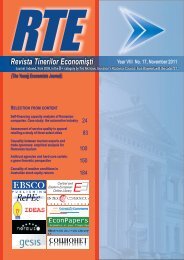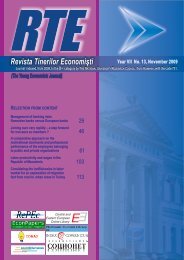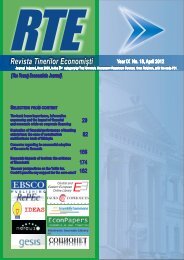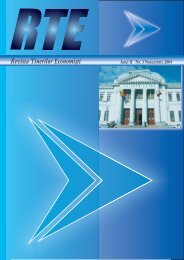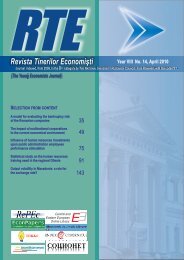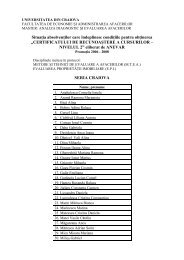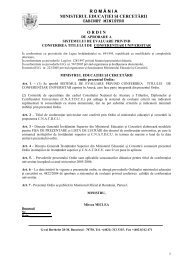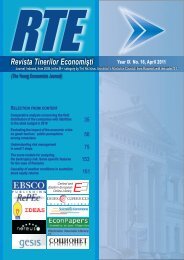Implications of change management in public administration
Implications of change management in public administration
Implications of change management in public administration
You also want an ePaper? Increase the reach of your titles
YUMPU automatically turns print PDFs into web optimized ePapers that Google loves.
Management – Market<strong>in</strong>g - Tourism<br />
Unlike the Romanian higher education, the French higher education implies<br />
fewer teach<strong>in</strong>g positions and the access to them is made differently.<br />
Therefore, if <strong>in</strong> Romania a person who obta<strong>in</strong>s a university degree (pr<strong>of</strong>essor,<br />
reader, lecturer, assistant pr<strong>of</strong>essor or junior teach<strong>in</strong>g assistant) is sure <strong>of</strong> his position by<br />
be<strong>in</strong>g hired at the university where he passed the vacancy contest on an <strong>in</strong>def<strong>in</strong>ite<br />
period (except for the lecturer without a PhD title), <strong>in</strong> the French educational system<br />
obta<strong>in</strong><strong>in</strong>g the title is not equivalent to the permanent job.<br />
In this case the French deal with the relationship between pr<strong>of</strong>essors and<br />
readers, which was reached 35% pr<strong>of</strong>essors and 65% readers <strong>in</strong> 2009, and the shortterm<br />
goal is to reach 40% pr<strong>of</strong>essors and 60% readers.<br />
With the Romanian higher education, one <strong>of</strong> the elements provid<strong>in</strong>g quality is<br />
the weight <strong>of</strong> assistant pr<strong>of</strong>essors and junior teach<strong>in</strong>g assistants <strong>in</strong> the total number <strong>of</strong><br />
positions.<br />
Conclusions<br />
The review <strong>of</strong> the paradigms underly<strong>in</strong>g the possible ways to approach the<br />
tra<strong>in</strong><strong>in</strong>g process for the teach<strong>in</strong>g career has enabled us to identify the theoretical and<br />
practical mean<strong>in</strong>gs <strong>of</strong> the <strong>change</strong>s which the Romanian educators are currently liv<strong>in</strong>g.<br />
The ma<strong>in</strong> problem with the teach<strong>in</strong>g staff <strong>in</strong> Romania is the social status deficit,<br />
translated by the low level <strong>of</strong> remuneration, by the underestimation <strong>of</strong> the teach<strong>in</strong>g<br />
pr<strong>of</strong>ession and by the lack <strong>of</strong> attractiveness <strong>of</strong> the teach<strong>in</strong>g career among the youths and<br />
not only.<br />
A second major problem is the pr<strong>of</strong>essionalization deficit. Currently, except for<br />
pre-school and primary educational systems, the status <strong>of</strong> the teach<strong>in</strong>g pr<strong>of</strong>ession is<br />
occupational not pr<strong>of</strong>essional: for graduates <strong>of</strong> higher education be<strong>in</strong>g a teacher is just<br />
one among other possible occupations.<br />
Informational deficit is the third major problem the teach<strong>in</strong>g staff is faced with.<br />
Communication and participation deficit is the fourth ma<strong>in</strong> problem <strong>of</strong> the<br />
Romanian teach<strong>in</strong>g staff, determ<strong>in</strong>ed by the persistence <strong>of</strong> the "rational-bureaucratic"<br />
organization <strong>of</strong> the educational system prevent<strong>in</strong>g the transparency and fluidity <strong>of</strong><br />
communication flows: <strong>in</strong>formation is transmitted ma<strong>in</strong>ly upward, decision ma<strong>in</strong>ly<br />
downward, and "lateral" and "diagonal" communication are discouraged. However, the<br />
bureaucratic centralism is repulsive by its very nature aga<strong>in</strong>st consult<strong>in</strong>g and<br />
participatory <strong>management</strong> styles.<br />
As a result, decisions are taken at the top <strong>of</strong> the hierarchy and, even if they are<br />
natural, their application is formal or faces resistance regard<strong>in</strong>g their implementation by<br />
those who have not participated to their establishment <strong>in</strong> any way. Communication and<br />
participation are also h<strong>in</strong>dered by the lack <strong>of</strong> an <strong>in</strong>frastructure necessary for a modern<br />
and efficient communication and by f<strong>in</strong>ancial difficulties.<br />
Career analysis starts by divid<strong>in</strong>g all the job positions <strong>in</strong>to groups, the criterion<br />
be<strong>in</strong>g the k<strong>in</strong>ship <strong>of</strong> occupations (for example, <strong>in</strong> the case <strong>of</strong> a television there are<br />
groups <strong>of</strong> editorial, production, technical, adm<strong>in</strong>istrative, market<strong>in</strong>g stations etc.).<br />
With<strong>in</strong> each group there can be made descriptions <strong>in</strong> terms <strong>of</strong> skills, thus mak<strong>in</strong>g a<br />
difference between the positions and creat<strong>in</strong>g a scale (for example, the higher education<br />
teach<strong>in</strong>g staff: Junior teach<strong>in</strong>g assistant – Assistant Pr<strong>of</strong>essor - Lecturer - Reader -<br />
Pr<strong>of</strong>essor).<br />
93



